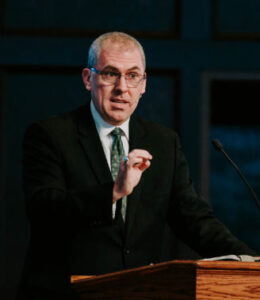Southern Baptists spent their annual meeting debating how tight the doctrinal boundaries should be around the denomination’s fellowship.
Sexual abusers are out. But so are members of the LGBTQ community and those who support them. Women pastors are out, although a study will be continued on use of the word “pastor” in churches. Abortion is definitely out. Doctrinal compromise of nearly any kind is out. Racism is out. Gun violence is frowned upon but without calling for any gun control.

Bart Barber
Despite these seemingly narrow views of faith and culture, the most far-right candidate for the SBC presidency was defeated by a more centrist candidate who is perceived as an institutional loyalist. In a runoff election, Texas pastor Bart Barber drew 61% of the vote, compared to Florida pastor Tom Ascol’s 39%.
Ascol was promoted by the Conservative Baptist Network, which claims the SBC has drifted into liberalism and wokeness and needs to “change the direction.” In two days this week, every candidate for any office supported by the Conservative Baptist Network has lost, including Ascol and another candidate for recording secretary, as well as all the officers of the SBC Executive Committee and the position of president of the SBC Pastors’ Conference.
The most anticipated item on the agenda was receipt of the report of the SBC Sexual Abuse Task Force, which worked from an independent investigation conducted by Guidepost Solutions. That one-hour presentation and debate elicited rapt attention and intense conversation before messengers approved two specific recommendations of the task force.
But the surprise star of the Tuesday afternoon session was Rick Warren, whose Saddleback Community Church was on the cusp of being expelled from the convention for ordaining three women as pastors last year. At last year’s annual meeting, the Credentials Committee was asked to review whether Saddleback — by far the largest church in the SBC — remains “in friendly cooperation with the SBC” since the Baptist Faith and Message states a belief that only men are biblically qualified to serve as pastors.
Attempt to oust Saddleback
The Credentials Committee on Tuesday morning asked for another year to study the Saddleback question, claiming more information was needed on the way some churches distinguish between a “lead pastor” or “senior pastor” and other pastoral staff roles.
That request angered the most conservative segment within the SBC, who said no further study is needed because the Baptist Faith and Message is crystal clear: Women may not be ordained or called as “pastors.” On this point, the SBC differs from nearly every other major Protestant body in the United States.
Among those opposing further study of the title “pastor” was Al Mohler, president of Southern Baptist Theological Seminary and a member of the committee that revised the Baptist Faith and Message in 2000.
“My concern is as a churchman, theologian and someone who loves this convention,” he said. “If we eventually have to form a study committee over every word in our statement of faith, then we’re doomed.”
“If we eventually have to form a study committee over every word in our statement of faith, then we’re doomed.”
Adam Greenway, president of Southwestern Baptist Theological Seminary, broke ranks with Mohler and attempted to offer a compromise through an amendment that would have described “friendly cooperation” with the SBC to include any church that “closely identifies with the convention’s adopted statement of faith.”
A show-of-hands vote on the amendment was too close to call, so a ballot vote was taken. Several hours later, officials reported Greenway’s amendment had failed.
At that point, President Ed Litton recognized Warren, who was the founding pastor of Saddleback and recently announced his retirement plans. Warren likened himself to a man who was about to be executed and should be allowed to offer final words. His comments repeatedly indicated he did not anticipate being part of the SBC by next year.

Rick Warren addresses messengers to the SBC annual meeting. (Photo courtesy of The Baptist Paper)
Nevertheless, he read what he called a “love letter” to the SBC. He described himself as a fourth-generation Southern Baptist who was educated at an SBC seminary and enabled as a church planter by the SBC. Not only is Saddleback the largest church in the convention, it has planted 90 more SBC churches in Orange County alone, he said. He spoke of the tens of thousands of people who have been baptized at Saddleback, the vast number who have received theological education and church-planter training.
Already, the convention allows room for those who do not believe God wants to save all people on earth, he said, a slam against the SBC’s neo-Calvinists.
“We have to decide if we’re gonna treat each other as allies or adversaries,” Warren said. “Are we gonna keep bickering over secondary issues or are we gonna keep the main thing the main thing?”
“We have to decide if we’re gonna treat each other as allies or adversaries. Are we gonna keep bickering over secondary issues or are we gonna keep the main thing the main thing?”
But none of that swayed Warren’s critics, who took to social media to excoriate him as something just short of a heretic and to reiterate that in their view, banning female pastors is a main thing.
However, Saddleback was not kicked out of the SBC yet. After Warren’s speech, the chair of the Credentials Committee came back to say the committee would withdraw its recommendation and continue to work on an answer to last year’s motion.
Sexual abuse report

Bruce Frank
Bruce Frank, chair of the Sexual Abuse Task Force, minced no words in addressing the damning Guidepost findings, saying it is now time for messengers to choose between doing the right thing or not in light of the “300 pages of failure to act.”
He rolled out a litany of one-liners:
- “The question on the floor today for the Southern Baptist Convention is, is it humbling?”
- “The funnel of God’s grace is repentance. It is not remorse.”
- “The cultural problem doesn’t stop when you put a steeple on top of the building.”
- “This is the tip of the iceberg.”
- “The purpose of the recommendations today is to resource churches to make better decisions.”
- “A wrong response to abuse causes even more damage.”
- “The two recommendations before you are the bare minimum of what can be called reform.”
- “The time for action has come. Without action, there is no repentance.”
- “It’s clear what God thinks about this. This is a biblical issue.”
- Whatever the cost of the investigation and response, “it’s not going to cost nearly as much as survivors have paid. … It’s not going to cost nearly as much as the stain on the name of Jesus Christ.”
- “The question is not what does Guidepost think of LGBT. The question is what do Southern Baptists think about sexual abuse.”
Two attempts were made to amend the task force recommendations. The first failed after the task force said the same content already exists in a footnote within the recommendation.
The second was received as a friendly amendment and incorporated with the blessing of the task force. It removed the name of Guidepost Solutions from the recommendations.
Later, another messenger opposed the task force recommendations on the grounds that Guidepost does not share the SBC’s sexual ethic. A firestorm of controversy erupted last week when the Guidepost corporate office tweeted a simple word of affirmation for LGBTQ persons during Pride week.
“We have a group that celebrates sexual sin advising us on how to handle the sin of sexual abuse.”
Tim Overton of Anderson, Ind., said: “I believe Guidepost has polluted this report. Let’s vote this down and pick it up next year. … We have a group that celebrates sexual sin advising us on how to handle the sin of sexual abuse.”
The most full-throated rejection of the task force report and recommendation came from Mark Coppenger, a former vice president at the SBC Executive Committee who in 1999 was fired as president of Midwestern Baptist Theological Seminary for anger management issues.

Mark Coppenger
“None of us is approving of sexual abuse. No church is affirming laxity or indifference as a church body,” he said. “I have the sense that this whole enterprise, which was stimulated by the Houston Chronicle, is a little bit like the 1619 Project, that our nation is stained, it’s massively troubled in so many ways and the like.”
Coppenger said the number of Southern Baptists who have been convicted of sexual abuse in churches is “a very small percentage” of Southern Baptists. “The burden of proof is on those who say we have a massive problem.”
There’s already a mechanism to address sexual abuse in the church, he said: “You act and turn to the civil authorities.” He added that some of those convicted of sexual abuse “should be shot.”
Nevertheless, the SBC does not need a “superstructure with massive funding” to address the issue, he said.
Coppenger’s comments were not well received by the task force chair, who said those convicted of sexual abuse are not the only ones abusing people in churches. And on the issue of funding, Bruce Frank said, “Everyone in this room has benefited from being a Southern Baptist,” including him because of his theological training at a deeply discounted tuition. Spending money to address the problem of sexual abuse and prevent it in the future is an appropriate expenditure, he added.
The two recommendations of the task force were handily passed.
After this discussion, the question was called and a vote was taken. The two recommendations of the task force were handily passed. One will create a new task force to continue implementation of reforms and the other will create an online database of convicted or confessed abusers in churches.
After the vote, messengers erupted into extended applause.
Tom and Jennifer Buck speak
At two separate times on Tuesday, East Texas pastor Tom Buck and his wife, Jennifer, attempted to draw attention to their complaint that because Tom Buck had raised a red flag about an SBC presidential candidate (who later withdrew from the race) others conspired against them in retaliation. The alleged retaliation was that an anonymous source leaked to Baptist News Global a draft of a first-person piece Jennifer Buck had written but never published that described problems in the first five years of their marriage.
Although BNG authenticated the document, the news service declined to write about it and only did so after Jennifer Buck published an edited version of her story on another website. Even then, BNG quoted only from the published version, not from the unpublished one However, the Bucks claimed Jennifer Buck was mistreated and outed as a sexual abuse survivor — a fact BNG did not report or claim.
The BNG article stated: “Neither the original version nor the published version of Jennifer Buck’s article mentions sexual abuse. Her stories center on emotional and verbal abuse.”
The Bucks have been on a campaign to discover who leaked the earlier draft and have accused staff members at Southeastern Baptist Theological Seminary of lying about their role in the sequence of events.
Nevertheless, the Bucks have been on a campaign to discover who leaked the earlier draft and have accused staff members at Southeastern Baptist Theological Seminary of lying about their role in the sequence of events.
Speaking during the report of the SBC Sexual Abuse Task Force, Tom Buck asked: “What assurance do these messengers have that when they go to report something that involves sexual abuse that they won’t be hung out to dry like my wife and I have?”
The Texas pastor reportedly sought help from the Sexual Abuse Task Force to discover the identity of the leaker but got no help. Task Force chair Bruce Frank replied on Tuesday: “While we individually grieved with you over that, there was a very narrow window the task force was assigned. (Your issue) was not within that. A formal statement was not appropriate at that point. We felt that a statement made by the committee was outside the purview and would be viewed as political as well.”
Earlier on Tuesday, another messenger made a motion from the floor calling for an independent investigation of Southeastern’s role in the Buck matter. Following normal protocol, the Committee on Order of Business referred that motion to Southeastern’s trustees.
At that point, Jennifer Buck went to a microphone in an attempt to appeal the ruling and force a vote on the floor of the convention. To do so would have required a two-thirds majority vote, which she did not get.
A landslide of motions
Across two time slots Tuesday, messengers introduced more than 30 motions — a large number by historical annual meeting standards.
Those motions ran the gamut of topics, with the most notable being these:
- Asking that the newly elected SBC president appoint a task force within 30 days to conduct a “forensic audit” of the North American Mission Board’s use of funds. NAMB leadership has been under withering criticism from state conventions and others over its secretive financial management.
- That the SBC amend its constitution to expressly prohibit affiliation with any church that appoints or affirms a woman “as a pastor of any kind.”
- That the International Mission Board be required to “allow medical autonomy to career missionaries by allowing them not to receive vaccines.”
- That a study be made on how to grant independence to Baptist Press, which is run by the Executive Committee.
- That the Ethics and Religious Liberty Commission be abolished. This motion will be debated on the convention floor Wednesday morning.
- That the SBC recording secretary no longer hold a seat on the Executive Committee.
- That the SBC “immediately boycott the Disney corporation” for its support of LGBTQ rights.
As happens most years at the SBC, the majority of motions was ruled out of order or referred to other SBC entities for consideration. Only one motion led to a floor debate, and that was about a request to demand a “forensic audit” of the North American Mission Board. See separate story here.
Resolutions
At the beginning of the day Tuesday, the Resolutions Committee unveiled nine proposed resolutions, including affirmation of rural churches, denouncing the Prosperity Gospel, denouncing the war in Ukraine, lamenting the forced conversions of the former federal Native American boarding schools, advocating more consistent laws on clergy sexual abuse, lamenting the SBC’s own history of covering up sexual abuse, anticipating with joy the likely overturn of Roe v. Wade, and thanking the host city of Anaheim, Calif.
Over the two days, all nine resolutions were adopted, some with minor modifications from the floor.
One other resolution stands out as the most curious of the bunch and is titled “On the Imago Dei and the Helpful Content Submitted in Several Resolutions.”
This resolution ties together the SBC’s denunciation of LGBTQ identity, concerns about gun violence and support for disabled persons.
This resolution ties together the SBC’s denunciation of LGBTQ identity, concerns about gun violence and support for disabled persons.
It speaks of “the value and dignity of every human being as created in the image of God” and the biblical command “to love God and love our neighbors as ourselves” while at the same time saying children “are exposed each day to countless narratives often at odds with God’s design for sexuality through mass media and various forms of entertainment, like social media, that promote ideologies that run contrary to the scientific and biological realities of the created order rooted in the dignity of every human being.”
Rejecting the view that marriage is only for one man and one woman and that same-sex relations are sinful “is not only an affront to God, but also a grave sin of selfishness, rebellion and pride,” it says.
In the next paragraph it expresses “solidarity with all those victimized by gun violence” because “the shedding of innocent blood is a repugnant and wicked evil that transgresses the moral law of God.” However, it makes no mention of any form of gun control.
Then it asserts “God’s glory is on display among all people that he has created, including our fellow precious image-bearers affected by disabilities … and how God has worked mightily through people affected by disabilities.”
It resolves that the SBC should “seek to love our neighbors as ourselves, standing firm on God’s created order which recognizes that any sexual desire or attraction outside of God’s design for human sexuality is sin and is disordered regardless of whether or not it creates feelings of guilt, shame or anxiety on the one hand or pride on the other hand.”
Related articles:
Breaking news: It will be a four-way race for SBC president
In early contests, Conservative Baptist Network loses SBC leadership posts
Unexpected $4 million gift takes away one criticism of SBC response to sexual abuse


